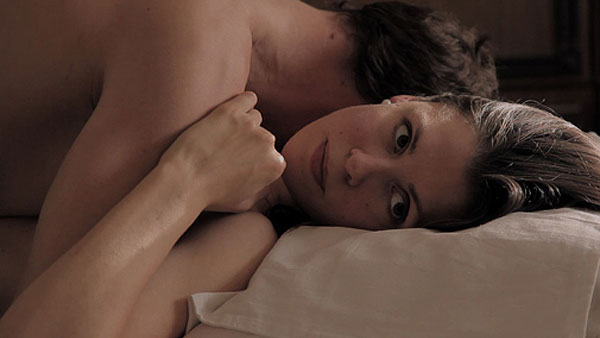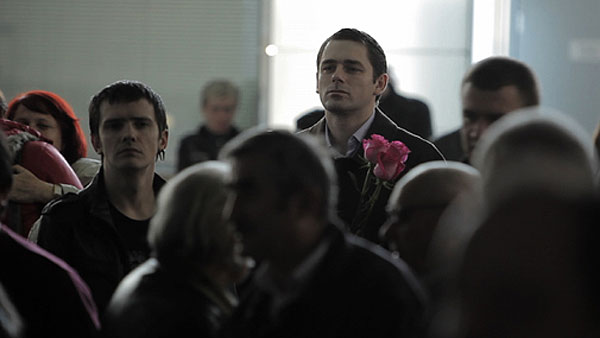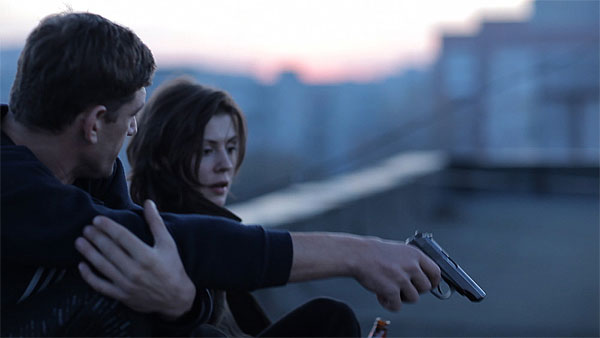Marina is a beautiful young woman from a wealthy Muscovite family. She secured a position as a social worker in the hope to help the outcasts of society; she married Ilya, a caring man; she lives in a comfortable house in a well-off neighborhood. On the surface, Marina’s life is flawless, but underneath things are far from perfection. One day a bunch of ruthless police officers sexually abuses Marina on her way back from work. The traumatic experience will make her reconsider her certainties, her current lifestyle and her relation with others, including those close to her — and among them Andrey, one of her abusers.


 Portret V Sumerkakh (Twilight Portrait in English) wants to offer a realistic representation of the complex moral conflicts and hypocrisies affecting contemporary Russia, where power is exercised at the expenses of the weak and where women are far from being treated equally to men — also because of their reluctance to stand up for their rights. Marina and Andrey occupy opposite places in Russian society and their experiences and education greatly differ; however abysmal the gap separating them, they will be able to find a common ground.
Portret V Sumerkakh (Twilight Portrait in English) wants to offer a realistic representation of the complex moral conflicts and hypocrisies affecting contemporary Russia, where power is exercised at the expenses of the weak and where women are far from being treated equally to men — also because of their reluctance to stand up for their rights. Marina and Andrey occupy opposite places in Russian society and their experiences and education greatly differ; however abysmal the gap separating them, they will be able to find a common ground.
Twilight Portrait is one of those spurious offsprings of Dogme 95. Too bad that Dogme 95 was one of the hugest frauds in the history of cinema, pretending to initiate something new and revolutionary, but delivering in fact a series of pretentious films with poorly written stories, focused on easily grabbing the spectator’s attention with a superficially controversial material presented in a visually appalling style. It is likely that production costs influenced Angelina Nikonova to embrace Dogme-like principles (for instance, she shot her film on a Canon 5D MK II), but low budget does not necessarily imply a shallow story, bad acting and awful technique.
The cinematography of the film feels very sloppy and the way the camera is handled is also quite mediocre; moreover, framing seems only functional to show the actors’ faces and bodies and thus not properly taken care of. In Twilight Portrait, there is not a single memorable moment, visually. This is only fair, as there is not a single moment worth remembering in the film’s diegesis as well. Characters give away too much and in the most pedestrian fashion: we have Marina delivering a long speech around the middle of the film which kind of explains to all the dumb viewers out there the dynamics at work in the story; likewise, we have other characters using the spoken word as a medium to let us understand details that, in the end, are not relevant at all. All these words are wasted to conceal that characters lack the necessary dimension, insight, disposition to keep us interested.
Olga Dykhovichnaya is totally deadpan in the role of Marina. Honestly, even when it is intentional, the deadpan approach in acting usually does not work, unless you are Lillian Gish or Kati Outinen. All Olga Dykhovichnaya seems to care about is pouting as subtly as she can and staring at something with wide-open eyes. Anyway, let’s admit it: she is not the only one to blame. Other actors are also pretty dull. When watching a film, I assume that if you spend most of the time thinking of the cast “I don’t believe this, they look so fake” when they are in fact trying to look spontaneous, then it means there is something wrong going on. I have watched soap operas where actors were far more believable than the cast of Twilight Portrait.
Overall, Twilight Portrait is so commonplace and characters so tedious that I cannot deny my disappointment that Angelina Nikonova’s work is the winner the New Discovery Award at this year’s RIFF. Of course, the Jury members are entitled to their opinion; personally, I feel there were more deserving candidates.
Wasn’t Ulrich Thomsen the presiding juror? No wonder then that this movie won the prize.
The worse thing about Dogma 95 are their detractors: they spoke too much seriously about a movement that was only a joke, another joke in the long career of jokes of Lars Von Trier and her friends.However,I think is possible to make a good film with the laws of Dogma 95, but most of the time inept directors are trying to hide their mediocrity under those laws,with some exceptions like,in my oppinion,”Julien Donkey Boy” by Harmony Korine or “Mifune”by Soren Kragh Jacobsen and ,of course,”Celebration” by Thomas Vinterberg ,a typical nordic drama with some “new” clothes courtesy of Dogma 95.Better dont talk about the Trilogy of Jean Marc Barr and Pascal Arnold, a monument of amateurism.I think that the methods of Dogma 95 in the hands of some good directors ,like Luc and Jean Pierre Dardenne , Andrea Arnold,or Juan Pinzas in Spain ,can offer good movies.
Von Trier was the first to take himself and his supposed authorship too seriously. Look at him now, look at his films. Dogme’s principles have been around without being labeled as such for as long as anybody can remember. So of course, you can make a decent film with Dogme’s principles. If only your concern is making a good film instead of making a fool of yourself and trying to cause a commotion every time.